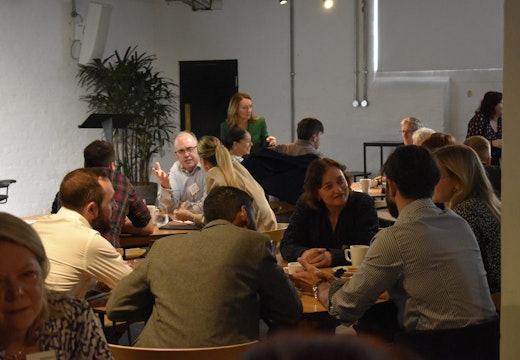Chicago’s top workplace professionals get down to business
Speakers at the WORKTECH Chicago 2023 conference were in no doubt: making well-informed commercial decisions depends on a practical plan of action for space, technology and people
There was a standing room-only crowd at the EY Wavespace in Chicago on 19 July 2023 for multiple compelling sessions on how organisations can use workplace design and technology to meet future business challenges. The focus of the presentations and discussions at the WORKTECH Chicago 2023 conference was how, in these uncertain times, to use resources wisely to create value for both employers and employees.
Participants seemed interested in making well-informed business decisions, motivating employees to return to the office, and ensuring that they have positive experiences wherever they are doing their jobs—within the realities imposed by available spaces, technologies, funding, and so on. Informed, prioritised plans for action were top-of-mind.
Deep personal flourishing
‘Eudaemonia’ was the word of the day, on the tip of attendees’ tongues, after David Dewane (Chief Experience Office, Physical Space at Geniant, and Adjunct Professor, Illinois Institute of Technology) made it the focus of his session (and taught everyone how to pronounce it). Eudaemonia, in short, can be thought of as ‘deep personal flourishing’, supporting living a ‘good’ life (one, according to Aristotle, that is filled with pleasure and honour, for example).
Dewane reported that it becomes more likely when workplaces and the objects/services associated with them are developed so that they align with user needs. Dewane’s session confirmed the importance of learning about users before creating for them and developing performative, as opposed to simply functional, spaces. He shared that high-performance workplaces have soul and a good spirit about them.
Supplying the magic
Lauren Green (Workplace Programs Design Partner, Google) and Corey Lewis (Senior Director of Workplace Services, Americas, Google) maintained the practical, get-things-done tone introduced by Dewane, sharing how they work to supply design- and technology-related experiences consistent with eudaemonia, user wellbeing and performance.
‘Google magic’ is their goal and supplying that magic really boils down to providing, at every step of the user journey from arrival to departure, a positive, life-enhancing at-work culture and experience. Green and Lewis talked about methodically dealing with all the reasons that people say they can’t return to the workplace – and taking experience-enhancing actions as necessary to overcome them.
Getting good stuff done
Practical action was also the focus of an expert panel (‘Agile Approaches to Urban Regeneration’), moderated by Margie Baran of JLL with panellists Molly Laurain (Director, Real Estate Design and Delivery, Salesforce), Lisa Keller (Corporate Services and Sustainability Strategic Program and Operations Senior Manager, Accenture), and Allison Winstel (Chief of Staff, MHUB, a manufacturing innovation centre). Developing locale-specific as well as user need-informed workplaces was a consistent refrain.
The ‘getting good stuff done now’ theme continued with a ‘Workplace Experience’ expert panel moderated by Haley Van Wagenen of EY with panellists Mitchel Bobman (Vice President, Workplace Technology, Northern Trust), Kerry Friffin (Senior Manager, Workplace-North American, Uber) and Julia Hays (Real Estate Strategy Lead, Mondelez International). This session was particularly focused on overcoming challenges such as measuring the outcomes of design, tech, human resources and other choices, and making data-based decisions to start with. The complexity of creating spaces that are very busy on some days and really empty on others was acknowledged by the group.
User research vital
After lunch, Jeffrey Martin (Vice President, Workplace Experiences, Wells Fargo) reiterated the importance of user-focused research (in his case by focusing on journey maps and user personas) as a means of better understanding work-related objectives for space and technology. Martin emphasised how important it was to ‘listen’ to users and identify their needs as solutions are developed.
In a session on ‘Technologies Reshaping the Way We Work’, a panel moderated by Theresa Broderick of EY discussed motivating employees to return to socialise with colleagues and for career development opportunities as well as the opportunity to level the playing field for all employees with tech.
‘The important role that technology plays in employee wellbeing…’
During her session, ‘Destination Office: Supercharging the Workplace,’ DeJeana Chappell (Principal, Workplace Strategy Leader, Strategy and Transactions, Corporate Real Estate, EY) continued to stress the important role that technology plays in the workplace, and how vital ‘getting it right’ is for employee wellbeing and for assessing the performance of those employees. Chappell applied Maslow’s hierarchy of needs to current workplace design indicating that, at its highest level, a workplace needs to foster growth, authenticity and achievement, and working down to more basic needs, supply social connection and satisfy basic needs (such as supplying seats to all that arrive).
Inclusive workplaces
Focus shifted slightly in the last two sessions of the day to focus even more directly on developing inclusive workplaces and ones that optimise user wellbeing. Willie Jackson (Partner, Head of Growth, ReadySet) stressed how technology can be used to employ a more diverse workforce as well as to support those employees once they are hired. In the closing keynote, workplace designer Kelly focused on adapting more feminist principles in workplaces and balancing Yin and Yang forces to create positive places.
All of these practical sessions left the WORKTECH Chicago crowd buzzing, ready to apply insights they’d gathered at the conference to create great workplace experiences for all.








